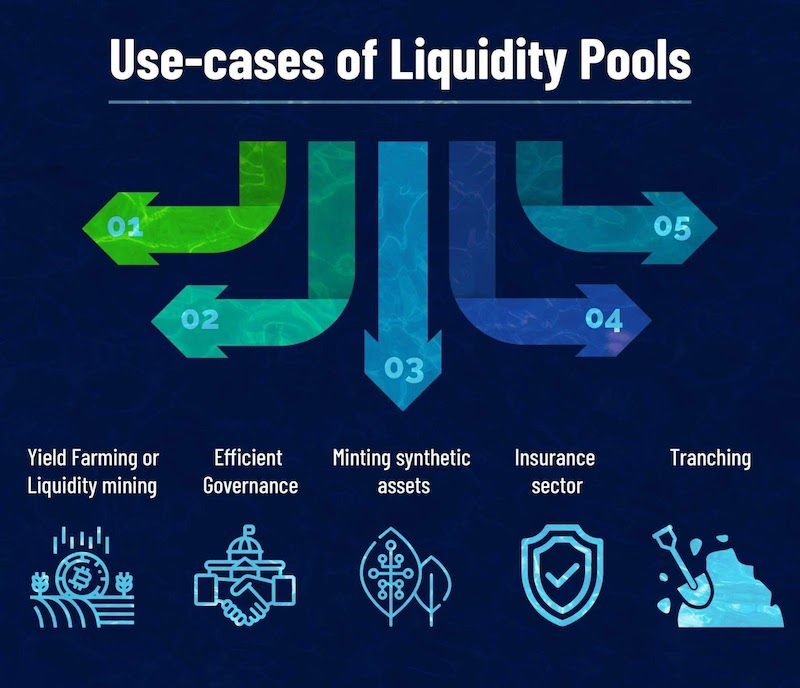As the DeFi space continues to grow and mature, more and more investors are looking for ways to get involved and earn a passive income. One popular way to do this is by providing liquidity to a cryptocurrency trading pair on a decentralized exchange (DEX).
In return for supplying liquidity, investors are typically rewarded with a portion of the trading fees generated by the DEX. This can be a great way to earn a passive income, but it's important to understand how these liquidity pools work before you invest.
In this guide, we'll walk you through everything you need to know about liquidity pools and how you can maximize your returns.
What Is a Liquidity Pool?

A liquidity pool is a collection of funds that are used for trading a particular cryptocurrency pair on a DEX. The pool is typically made up of two types of investors: those who provide the capital (liquidity providers) and those who trade the pair (traders).
Liquidity providers earn a portion of the trading fees generated by the DEX, while traders pay a small fee for each trade they make.
How Do Liquidity Pools Work?
In order to understand how liquidity pools work, it's important to first understand how DEXes work.
Unlike centralized exchanges, DEXes are decentralized and run on a blockchain. This means that they are not subject to the same regulations as centralized exchanges, which can be a good thing or a bad thing depending on your perspective.
One of the benefits of DEXes is that they are much more secure than centralized exchanges because there is no central point of failure. However, this also means that DEXes typically have lower liquidity than centralized exchanges.
This is where liquidity pools come in. By providing liquidity to a DEX, investors can help to increase the liquidity of the exchange and, in return, earn a portion of the trading fees generated.
What Are the Benefits of Investing in a Liquidity Pool?
There are many benefits to investing in a liquidity pool, but the two main ones are:
- Passive income:
Liquidity providers earn a portion of the trading fees generated by the DEX, which can be a great way to earn a passive income.
- Price discovery:
By providing liquidity to a DEX, you are helping to provide the capital necessary for price discovery. This can be a good way to get involved in the early stages of a project and potentially earn a higher return on your investment.
What are the Risks of Investing in a Liquidity Pool?
There are also some risks to be aware of before you invest in a liquidity pool, which include:
- Market risk:
The value of your investment can go up or down depending on the performance of the underlying assets.
- Exchange risk:
If the DEX you are invested in gets hacked or goes offline, you may lose access to your investment.
- Liquidity risk:
If the liquidity pool you are invested in dries up, you may have to wait a long time to withdraw your investment.
How to Maximize Your Returns?
If you're thinking about investing in a liquidity pool, there are some things you can do to maximize your returns. Here are a few tips:
- Diversify your investments:
Don't put all your eggs in one basket. Diversifying your investments across different types of assets and different exchanges can help to minimize your risk.
- Do your research:
It's important to understand how the liquidity pool works before you invest. Make sure you know what fees you're paying and what kind of return you can expect.
- Have a long-term perspective:
Liquidity pools can be a great way to earn a passive income, but they are not a get-rich-quick scheme. Investing for the long term can help you to maximize your returns.
- Use stop-loss orders:
Stop-loss orders can help to protect your investment by automatically selling your assets if they reach a certain price. This can help you to minimize your losses if the market turns against you.

Why You Should Consider Including a Liquidity Pool in Your Investment Portfolio?
There are many benefits to including a liquidity pool in your investment portfolio.
Here are 10 reasons to consider adding a liquidity pool to your investment strategy:
- It can help you weather market volatility.
This is perhaps the most important reason to consider adding a liquidity pool to your investment portfolio. A well-funded liquidity pool can help you weather market volatility and protect your assets from sudden declines.
- Gives you peace of mind.
When you know you have a buffer of cash available in the event of an emergency, it can help you sleep better at night. This peace of mind is worth its weight in gold.
- Helps you avoid selling assets at a loss.
If you need to raise cash quickly, a liquidity pool gives you the option of selling less-liquid assets without having to take a huge loss.
- Provides a source of emergency funds.
Life is unpredictable. If you lose your job or face a financial emergency, a liquidity pool can help tide you over until you get back on your feet.
- Can be used to take advantage of opportunities.
If you see a great investment opportunity but don’t have the cash on hand to take advantage of it, you can use funds from your liquidity pool.
- Gives you flexibility.
A liquidity pool gives you the flexibility to respond to changing market conditions and take advantage of opportunities as they arise.
- Can be a source of passive income.
If you invest in a high-yield savings account or short-term bond fund, your liquidity pool can serve as a source of passive income.
- Protects you from inflation.
If you invest in cash equivalents or short-term bonds, the principal value of your liquidity pool will be protected from inflation.
- Helps you avoid selling assets in a down market.
If you need to raise cash, but the markets are in a downturn, a liquidity pool gives you the option of selling less-liquid assets without having to take a huge loss.
- It allows you to sleep soundly at night.
When you know you have a buffer of cash available in the event of an emergency, it can help you sleep better at night. This peace of mind is worth its weight in gold.
What's Next?
If you're thinking about investing in a liquidity pool, the first step is to do your research. Make sure you understand how the pool works and what kind of return you can expect.
Once you've done your research, you can start looking for a pool to invest in. There are many different pools to choose from, so it's important to compare them to find the one that's right for you.
Finally, remember to have a long-term perspective and to diversify your investments. These two things can help you to minimize your risk and maximize your returns.
Find us here:
Website ▶️ https://www.coinex.com
Twitter ▶️ https://twitter.com/coinexcom/
Telegram ▶️ https://t.me/CoinExOfficialEN
Medium ▶️ https://medium.com/@coinex
Reddit ▶️ https://www.reddit.com/r/CoinEx/
Facebook ▶️ https://www.facebook.com/thecoinex/
Instagram ▶️ https://www.instagram.com/coinexcom/